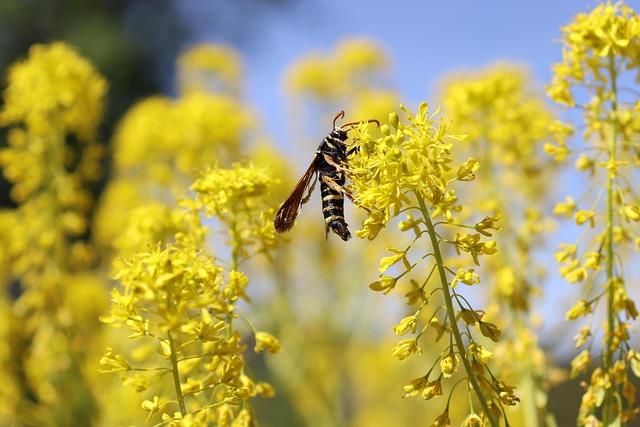Wasp populations in residential areas can be safely and effectively managed through understanding their behaviors, habitats, and seasonal activities. Non-lethal control methods, targeted treatments, and public education promote humane management while preserving the local ecosystem. Eco-friendly solutions like natural repellents and traps are available, and professional services offer expert identification and ongoing prevention education. Proactive measures such as regular inspections and maintaining a clean environment significantly reduce wasp infestations.
Wasp populations can pose significant risks, but innovative techniques offer safe and eco-friendly management solutions. Understanding wasp behaviors and habitats is crucial for effective control. This article explores a range of options, from non-toxic, residential wasp treatment alternatives to professional services for severe infestations. Learn about preventative measures to ensure a secure and harmonious coexistence with these intriguing insects, focusing on practical, safe, and sustainable residential wasp treatment methods.
Understanding Wasp Behaviors and Habitat
Wasp populations can be managed safely by understanding their behaviors and habitats, which are often closely tied to human activities in both urban and rural settings. Residential wasp treatment requires a nuanced approach because wasps are not only important pollinators but also predators of other insects that can be pests. By observing wasp activity during different seasons, you can identify nesting sites and understand when they are most active. This knowledge is crucial for implementing effective, non-lethal control methods such as removing nests carefully or using specific repellents that disrupt their foraging patterns without harming the environment.
In residential areas, wasps often build nests in attics, behind sheds, or under deck railings. Understanding these habitats allows property owners and professionals to employ targeted treatments, like strategic insecticide applications or the introduction of natural predators, to manage wasp populations humanely. Additionally, educating residents about wasp behavior can foster a coexisting relationship with these beneficial insects while ensuring safety for people and pets.
Non-Toxic and Eco-Friendly Residential Wasp Treatment Options
When it comes to dealing with wasps around the home, there are non-toxic and eco-friendly options available that provide effective residential wasp treatment without resorting to harmful chemicals. One such method is the use of natural repellents. Plants like citronella, lavender, and peppermint have been shown to deter wasps naturally. Placing these plants around your property can help keep wasps at bay.
Another innovative approach is the strategic placement of traps. There are various types of wasp traps designed to capture and eliminate wasps humanely. These include sticky traps and electric shock traps, which are both effective in reducing wasp populations without harming beneficial insects or the environment. By combining these natural and mechanical methods, homeowners can achieve a safe and sustainable residential wasp treatment strategy that protects both their living spaces and the local ecosystem.
Professional Wasp Control Services: When and Why to Hire Experts
Wasp populations can quickly become a nuisance, especially in urban areas where they often nest near human habitats. If you’re dealing with a significant wasp presence on your property, considering professional wasp control services is essential for safe and effective management. These experts are equipped with specialized knowledge and tools to handle even the most intricate wasp infestations.
Hiring professionals for residential wasp treatment offers several advantages. First, they can identify the specific type of wasp colony and its location, ensuring targeted and precise treatment. This approach minimizes the risk to you, your family, and pets, as well as protects nearby wildlife. Additionally, professional services employ eco-friendly methods that are safe for the environment, aligning with modern concerns about pest control’s ecological impact. They also provide ongoing solutions, educating property owners on prevention strategies to deter future wasp invasions.
Preventative Measures for Safe and Effective Wasp Management
When it comes to managing wasp populations, especially in residential areas, preventative measures are key to ensuring safety and effectiveness. One of the most effective strategies is to implement a comprehensive inspection program. This involves regularly scanning properties for any signs of wasp nests or activity, focusing on common areas like attics, walls, and trees. Early detection allows for timely intervention, making it easier to employ targeted treatments with minimal environmental impact.
Additionally, sealing entry points and maintaining a clean environment significantly reduces the likelihood of wasp infestations. This includes repairing cracks and gaps in walls, securing garbage bins with tight-fitting lids, and regularly cleaning outdoor spaces free from food debris or water sources that might attract wasps. For residential wasp treatment, a proactive approach combines these preventative steps with targeted, eco-friendly solutions, ensuring both the safety of occupants and the preservation of beneficial insect populations.
In conclusion, managing wasp populations requires a balanced approach that considers both human safety and environmental impact. By understanding wasp behaviors and implementing eco-friendly treatment options like non-toxic residential wasp treatments or professional control services, we can effectively mitigate their presence without causing harm. Preventative measures play a crucial role in long-term success, ensuring safe and sustainable wasp management for all.
